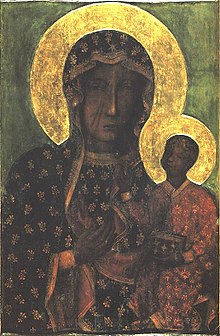Erzulie: Difference between revisions
No edit summary |
No edit summary |
||
| Line 6: | Line 6: | ||
==Erzulie Freda Dahomey== |
==Erzulie Freda Dahomey== |
||
''Erzulie Freda'' [[Dahomey]], the [[Rada loa|Rada]] aspect of Erzulie, is the spirit of love, beauty, jewellery, dancing, luxury, and flowers. Homosexual men are considered to be under her particular patronage. She wears three [[wedding ring]]s, one for each husband - [[Damballa]], [[Agwe]] and [[Ogoun]]. She is often envisioned as a beautiful [[ |
''Erzulie Freda'' [[Dahomey]], the [[Rada loa|Rada]] aspect of Erzulie, is the spirit of love, beauty, jewellery, dancing, luxury, and flowers. Homosexual men are considered to be under her particular patronage. She wears three [[wedding ring]]s, one for each husband - [[Damballa]], [[Agwe]] and [[Ogoun]]. She is often envisioned as a beautiful [[mixed-race]] woman of great wealth, wearing excessive amounts of jewellery <ref>Maya Deren, Divine Horsemen The living Gods of Haiti </ref>. Her symbol is a heart, her colours are pink, blue, white and gold, and her favourite sacrifices include jewellery, perfume, sweet cakes and liqueurs. Coquettish and very fond of beauty and finery, Erzulie Freda is femininity and compassion embodied, yet she also has a darker side; she is seen as jealous and spoiled and within some vodoun circles is considered to be lazy. When she mounts a serviteur she flirts with all the men, and treats all the women as rivals. In [[Christian iconography]] she is often identified with the [[Our Lady of Sorrows|Mater Dolorosa]]. She is conceived of as never able to attain her heart's most fervent desire. For this reason she always leaves a service in tears. |
||
==Erzulie Dantor== |
==Erzulie Dantor== |
||
Revision as of 18:31, 3 November 2009
This article needs additional citations for verification. (September 2008) |

In Vodou, Erzulie (sometimes spelled Ezili) is a family of lwa, or spirits.
Erzulie Freda Dahomey
Erzulie Freda Dahomey, the Rada aspect of Erzulie, is the spirit of love, beauty, jewellery, dancing, luxury, and flowers. Homosexual men are considered to be under her particular patronage. She wears three wedding rings, one for each husband - Damballa, Agwe and Ogoun. She is often envisioned as a beautiful mixed-race woman of great wealth, wearing excessive amounts of jewellery [1]. Her symbol is a heart, her colours are pink, blue, white and gold, and her favourite sacrifices include jewellery, perfume, sweet cakes and liqueurs. Coquettish and very fond of beauty and finery, Erzulie Freda is femininity and compassion embodied, yet she also has a darker side; she is seen as jealous and spoiled and within some vodoun circles is considered to be lazy. When she mounts a serviteur she flirts with all the men, and treats all the women as rivals. In Christian iconography she is often identified with the Mater Dolorosa. She is conceived of as never able to attain her heart's most fervent desire. For this reason she always leaves a service in tears.
Erzulie Dantor
In her Petro nation aspect as Erzulie Dantor she is often depicted as a scarred and buxom black woman, holding a child protectively in one hand and a knife in the other. She is a warrior and a particularly fierce protector of women and children. Her colours are red, gold and navy blue, her symbols are a pierced heart, knives, and her favourite sacrifices include black pigs, fried pork (griot) and rum. She is often identified with lesbian women. It is believed that a common depiction of Erzulie Dantor has its roots in copies of the icon of the Black Madonna of Częstochowa, brought to Haiti by Polish soldiers fighting on both sides of the Haitian Revolution from 1802 onwards.[2]
Other Aspects
Erzulie in popular culture
Erzulie (Freda) is also a character in the broadway musical Once On This Island as the beautiful goddess of love.
Notes
- ^ Maya Deren, Divine Horsemen The living Gods of Haiti
- ^ "Re Polish presence in Haiti : Judson comments"—Discussion on webster.edu.
